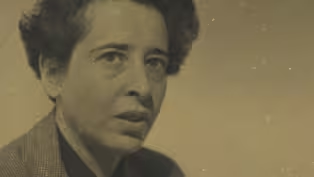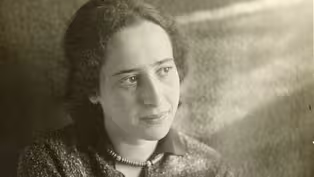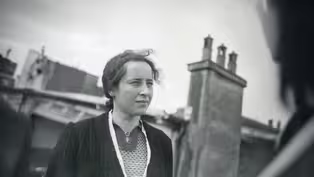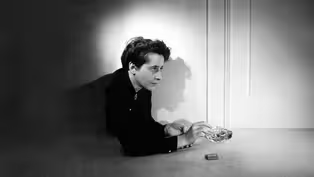
How Hannah Arendt developed the concept of "the banality of evil"
Clip: 6/27/2025 | 3m 39sVideo has Closed Captions
Hannah Arendt came up with the concept of “the banality of evil” during the trial of Adolf Eichmann.
Hannah Arendt came up with the concept of “the banality of evil” during her coverage of the 1961 trial of Adolf Eichmann. During the trial, Eichmann, one of the main organizers of the Holocaust, insisted that he was only obeying the law and following orders. Arendt said: “There’s simply the reluctance ever to imagine what the other person is experiencing. That is the banality of evil.”
Problems playing video? | Closed Captioning Feedback
Problems playing video? | Closed Captioning Feedback
Support for American Masters is provided by the Corporation for Public Broadcasting, AARP, Rosalind P. Walter Foundation, Judith and Burton Resnick, Blanche and Hayward Cirker Charitable Lead Annuity Trust, Koo...

How Hannah Arendt developed the concept of "the banality of evil"
Clip: 6/27/2025 | 3m 39sVideo has Closed Captions
Hannah Arendt came up with the concept of “the banality of evil” during her coverage of the 1961 trial of Adolf Eichmann. During the trial, Eichmann, one of the main organizers of the Holocaust, insisted that he was only obeying the law and following orders. Arendt said: “There’s simply the reluctance ever to imagine what the other person is experiencing. That is the banality of evil.”
Problems playing video? | Closed Captioning Feedback
How to Watch American Masters
American Masters is available to stream on pbs.org and the free PBS App, available on iPhone, Apple TV, Android TV, Android smartphones, Amazon Fire TV, Amazon Fire Tablet, Roku, Samsung Smart TV, and Vizio.
Buy Now

A front row seat to the creative process
How do today’s masters create their art? Each episode an artist reveals how they brought their creative work to life. Hear from artists across disciplines, like actor Joseph Gordon-Levitt, singer-songwriter Jewel, author Min Jin Lee, and more on our podcast "American Masters: Creative Spark."Providing Support for PBS.org
Learn Moreabout PBS online sponsorship- [Narrator] So the horror of the Holocaust, 15 years later, walks into this courtroom.
It's beamed across the world.
It's on American TV every night.
(lawyer speaking German) - [Interpreter] Here with me at this moment stands 6 million prosecutors.
But alas, they cannot rise to level the finger of accusation in the direction of the glass dock and cry out "j'accuse" against the man who sits there.
- This is the opportunity to try and understand this new crime, a crime against humanity itself.
(Eichmann speaking German) - [Narrator] Eichmann tried a number of times to explain that during the Third Reich, the Fuhrer's words had the force of law.
He did his duty, as he told the court over and over again.
He not only obeyed orders, but he also obeyed the law.
He was perfectly sure that he was not what he called an inner Schweinehund, a dirty bastard in the depths of his heart.
And as for his conscience, he remembered perfectly well that he would have had a bad conscience only if he had not done what he had been ordered to do, to ship millions of men, women, and children to their death with great zeal and the most meticulous care.
He left no doubt that he would have killed his own father if he had received an order to that effect.
(lawyer speaking German) (Eichmann speaking German) (lawyer speaking German) (Eichmann speaking German) (lawyer speaking German) (Eichmann speaking German) (lawyer speaking German) (Eichmann speaking German) (papers rustling) - [Narrator] Banality was a phenomenon that really couldn't be overlooked.
The more one listened to him, the more obvious it became that his inability to speak was closely connected with his inability to think, namely, to think from the standpoint of someone else.
There's nothing deep about it, nothing demonic.
There's simply the reluctance ever to imagine what the other person is experiencing.
That is the banality of evil.
Video has Closed Captions
Preview: 6/27/2025 | 2m | Discover Hannah Arendt, one of the most fearless political writers of modern times. (2m)
Hannah Arendt’s reflections on being a refugee
Video has Closed Captions
Clip: 6/27/2025 | 1m 14s | Hannah Arendt became a stateless person in 1933 upon fleeing Germany to France. (1m 14s)
What sparked Hannah Arendt's ideas behind "The Origins of Totalitarianism"
Video has Closed Captions
Clip: 6/27/2025 | 2m 49s | Hannah Arendt came up with ideas for “The Origins of Totalitarianism” while observing Hitler. (2m 49s)
Why McCarthyism was familiar to Hannah Arendt
Video has Closed Captions
Clip: 6/27/2025 | 2m | Hannah Arendt was teaching at Berkeley when McCarthyism took hold of the United States. (2m)
Providing Support for PBS.org
Learn Moreabout PBS online sponsorshipSupport for PBS provided by:
Support for American Masters is provided by the Corporation for Public Broadcasting, AARP, Rosalind P. Walter Foundation, Judith and Burton Resnick, Blanche and Hayward Cirker Charitable Lead Annuity Trust, Koo...




















